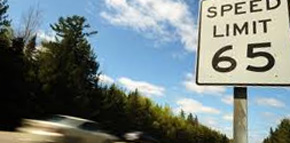Florida Senate Approves Higher Speed Limits
April 25, 2014
The Senate approved a measure Thursday that could increase the posted speed to 75 mph on certain stretches of state roads, where motorists would be allowed to push the lead to 80 mph with little fear of getting a ticket.
Despite concerns expressed by some lawmakers about safety and the potential impact on tourists and seniors, senators voted 27-11 to support the measure (SB 392), which directs the Florida Department of Transportation to determine whether to increase the minimum and maximum speed limits on all divided highways that have at least four lanes.
 “We’re not talking about raising the speed limits to 90 (mph) or 95, we’re talking about the potential to raise the speed limit a mere 5 miles per hour,” said Sen. Jeff Clemens, a Lake Worth Democrat who sponsored the bill. “I would suggest to you, ladies and gentlemen, that 5 miles per hour clearly is not going to cause any difference in safety of our constituents in the state of Florida.”
“We’re not talking about raising the speed limits to 90 (mph) or 95, we’re talking about the potential to raise the speed limit a mere 5 miles per hour,” said Sen. Jeff Clemens, a Lake Worth Democrat who sponsored the bill. “I would suggest to you, ladies and gentlemen, that 5 miles per hour clearly is not going to cause any difference in safety of our constituents in the state of Florida.”
But Sen. Arthenia Joyner, D-Tampa, argued that allowing speeds to be increased could become problematic for many of the state’s seniors and tourists who aren’t used to the higher speeds.
“Slow down, Senate,” Joyner said. “Let’s not increase the speed. This is a safety issue. The faster you go, the more lives are in peril, and you don’t get there but maybe 10 seconds, or more, faster than the person driving the speed limit.”
The Senate action could put the pedal to the metal on the House companion (HB 761), which has yet to appear on the floor since clearing the second of its two scheduled committee appearances on April 11.
The result of the transportation studies could be that Florida joins Maine and 16 western states is posting maximum speeds at 75 mph or higher.
The 75 mph limit is a speed many motorists already drive on the highway, as Florida law allows for a warning to those traveling less than 6 miles per hour over the posted speed limit.
Sen. Audrey Gibson, D-Jacksonville, said increasing the maximum and minimum speed limit will only “encourage all drivers to drive faster, whether they want to or not.”
“We’re a tourist state and we want people to slow down and not speed up,” Gibson said. “Just because we can increase the speeds in certain areas doesn’t mean we should.”
St. Petersburg Republican Sen. Jeff Brandes, the other sponsor of the bill, defended the proposal as simply allowing state engineers to determine the safe speeds on rural stretches of roads.
The bill could eventually allow state transportation officials to increase speed limits on Florida’s “limited access highways” to 75 mph and raise the maximum posted limits on divided four-lane highways in sparsely-populated rural areas from 65 mph to 70 mph. The transportation department could hike speeds to 60 mph on other roads they deem safe. And the agency would also have the authority to set minimum speeds on certain highways.
The proposal, opposed by AAA, was not requested by Florida Department of Transportation Secretary Ananth Prasad.
Prasad has said his agency would only conduct the speed studies in select areas where conditions may warrant an increase.
Florida’s highways have had a 70 mph maximum since 1996, the last time the speed limit was reviewed.
In other states, higher speed limits have resulted in more deaths from speeding accidents because drivers’ reaction times are reduced, and the severity of injuries is intensified, according to the Insurance Institute for Highway Safety.
by Jim Turner, The News Service of Florida
Comments
4 Responses to “Florida Senate Approves Higher Speed Limits”



They don’t care Tommy, I guess they don’t think about mechanical problems or a blow out, or people trying to enter interstates, or some people not paying attention, they approve this, they’ll approve another one, some roads aren’t safe for 55, but they won’t fix sides or widen them
I believe there should be stretches of interstate with no posted limits. Speed does not cause accidents. Failure to yield does.
The Audubon in Germany is one of the safest highways in the world. It’s a shame that Hitler gets the credit for building it.
Seems there’s a lot of time and effort spent legislating what is already taking place.
Why not just allow a “cushion” of + 5 miles per hour over what is posted?
Also read where the FHP Troopers (GREAT professionals) will partially be evaluated on making 4 “citizen contacts” per hour.
If this is true and if it becomes a measurement tool for Trooper performance, I ask how in the heck are they to supposed to do that?
Hopefully, this was some pipe dream of our legislature and the Troopers will be left alone on the 4 per hour rule.
Do you remember “Arrive Alive drive 55″ , and all those facts about how much fuel that would be saved.